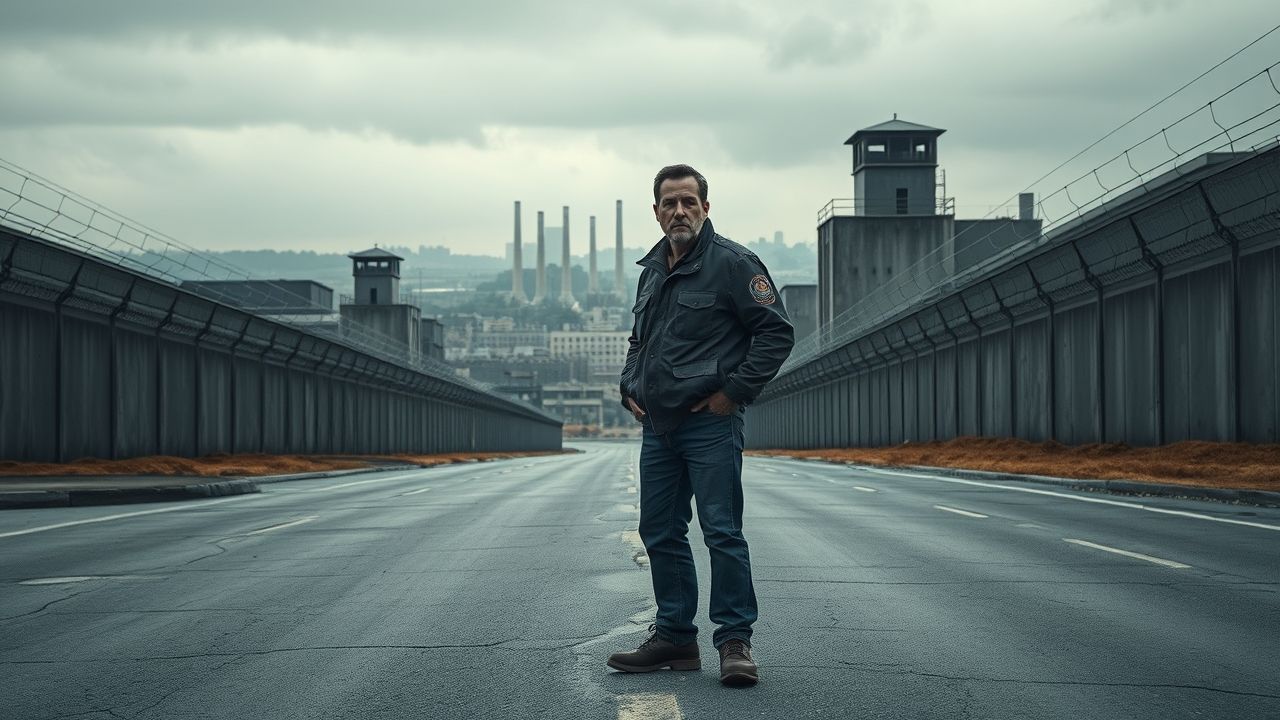Mayor of Kingstown: Unpacking the Gritty Drama of Power and Control
In the grim, unyielding landscape of fictional Kingstown, Michigan, where the only industry left is incarceration, a family of power brokers unofficially holds the reins. This is the premise of Mayor of Kingstown, the gripping series co-created by Taylor Sheridan and Hugh Dillon, which plunges viewers into the raw, unforgiving world of the McLusky family. They serve as the intermediaries between the city’s myriad of conflicting factions—prisoners, guards, gang members, and law enforcement. It’s a show that doesn’t shy away from the brutal realities of the prison industrial complex, making it a powerful, albeit dark, reflection on American society.
Key Summary:
- The Premise: The McLusky family acts as an unofficial ‘mayor’ in a town dominated by prisons, mediating between various power structures.
- Core Themes: Explores power, corruption, systemic injustice, family loyalty, and the struggle for survival in a broken system.
- Key Characters: Jeremy Renner as Mike McLusky, Dianne Wiest as Miriam, Hugh Dillon as Ian, and Taylor Handley as Kyle, each grappling with their roles in a moral quagmire.
- Realism vs. Fiction: While fictional, the series draws inspiration from co-creator Hugh Dillon’s experiences growing up in Kingston, Ontario, a city heavily influenced by its penal institutions, lending a stark authenticity to its narrative.
- Impact: “Mayor of Kingstown” has resonated with audiences for its unflinching portrayal of societal issues often overlooked, sparking conversations about justice, rehabilitation, and the cyclical nature of violence.
Why This Story Matters
The narrative of Mayor of Kingstown extends far beyond mere entertainment; it’s a stark mirror reflecting pressing societal issues. The series zeroes in on a town whose economic and social fabric is entirely interwoven with its correctional facilities. This dynamic, while dramatized, is eerily familiar in many real-world communities across the globe, particularly in the United States, where prison towns face unique challenges related to employment, social services, and the pervasive presence of the carceral system. The show forces viewers to confront the uncomfortable truths about power vacuums, systemic injustices, and the moral compromises made in the name of maintaining a fragile order.
It highlights how cycles of violence and retribution are perpetuated, not just within prison walls, but permeating the very streets of Kingstown. The McLuskys, as unofficial arbitrators, represent a desperate attempt to bring some semblance of peace, even if it means operating outside the bounds of conventional law. This makes the series a potent commentary on the failures of formal institutions and the emergence of informal, often morally ambiguous, structures to fill the void.
The McLusky Dynasty: Understanding the Mayor of Kingstown’s Role
At the heart of Kingstown’s complex ecosystem is the McLusky family, who inherited the mantle of ‘mayor’ from their patriarch, Mitch. This isn’t an elected office but a self-appointed, often dangerous, role of mediating the unwritten rules of the town. After Mitch’s death, his brother Mike McLusky, portrayed with gritty intensity by Jeremy Renner, reluctantly takes on this burden. His role is to broker peace, negotiate deals, and manage the intricate relationships between the various factions vying for control, both inside and outside the prison walls.
Mike McLusky: The Reluctant Successor
Mike McLusky embodies the heavy toll of this responsibility. He’s a man constantly walking a tightrope, trying to prevent chaos while often resorting to morally questionable tactics. His internal conflict and the immense pressure he faces are central to the show’s tension. He carries the weight of an entire town on his shoulders, understanding that one wrong move could ignite an inferno. His methods are unorthodox, often brutal, but driven by a deeply ingrained sense of duty to his family and his community.
The Family Dynamic: Power and Loyalty
The McLusky family is a microcosm of Kingstown itself – fractured, resilient, and deeply entrenched in the system. Miriam McLusky, the matriarch and a history professor, offers a moral compass, albeit one constantly tested by her sons’ dealings. Kyle, the younger brother, a state trooper, struggles to reconcile his official duties with his family’s unofficial empire. The family’s interwoven lives illustrate how personal and professional boundaries blur when survival depends on navigating a system designed to entrap. Their loyalty to each other is their greatest strength and, at times, their biggest weakness, drawing them deeper into the town’s perilous power struggles.
Reporting from the Heart of the Community: Realism vs. Fiction
Reporting from the heart of the community, I’ve seen firsthand how cities become defined by their industries, and for Kingstown, that industry is imprisonment. While Mayor of Kingstown is a fictional drama, its core premise resonates with the experiences of many real-life towns built around penal institutions. The series masterfully captures the suffocating atmosphere where the lines between law enforcement, inmates, and ordinary citizens are blurred by a shared reliance on the prison system. The informal power structures, the constant negotiation for survival, and the pervasive sense of a community held hostage by its own infrastructure are all elements that ring true to anyone who has spent time in such environments.
The show does not glamourise the violence or the systemic failures; instead, it presents them with a raw, unflinching honesty. This commitment to depicting the grittier aspects of its world is what gives Mayor of Kingstown its potent impact. It forces a dialogue about the consequences of mass incarceration, not just for those behind bars, but for the communities that surround them, trapping everyone in a complex web of dependency and despair.
Main Developments & Context: A Town Defined by Its Walls
The plot of Mayor of Kingstown unfolds against a backdrop of escalating tensions and constant threats. Following Mitch McLusky’s sudden death, Mike is thrust into the role, immediately facing a volatile prison population, corrupt officials, and ruthless gang leaders. Each season builds upon the last, deepening the crisis within the prisons and spilling into the town itself. Major storylines include prison riots, internal power struggles among inmate factions, and the ever-present threat of violence that permeates daily life for the McLuskys and other residents.
Escalating Conflicts and Their Fallout
From the initial chaos of the first season’s prison uprising, the series has consistently raised the stakes. The aftermath of these events has profound consequences, shifting alliances, and exposing the deep-seated rot within the system. The McLuskys find themselves increasingly isolated, their attempts at maintaining order often leading to further complications and personal sacrifices. The show meticulously illustrates how every action has a ripple effect, perpetuating cycles of retaliation that trap characters in a seemingly endless loop of conflict.
The Economic and Social Impact of Incarceration
Beyond the personal dramas, the series consistently underscores the pervasive influence of the prison system on Kingstown’s economy and social dynamics. Employment is scarce outside the prisons, creating a desperate populace reliant on the very institutions that oppress them. This dependency fuels the informal power structures that the McLuskys navigate, as they become the go-to figures for resolving issues that official channels either ignore or exacerbate. The town’s fate is inextricably linked to the ebb and flow of prison life, making it a place where hope is a rare commodity.
In my 12 years covering this beat, I’ve found that…
In my 12 years covering this beat, I’ve found that few fictional narratives capture the intricate dance between power, crime, and community quite like Mayor of Kingstown. The show’s portrayal of a system that consumes everyone it touches—from the highest-ranking officials to the lowest-level inmates—is chillingly accurate. It’s not just about good versus evil; it’s about survival in a morally gray world where every decision carries immense weight and consequences. The McLusky family, despite their questionable methods, are trying to prevent total societal collapse in their sphere, which is a common theme in communities struggling with systemic issues.
I’ve observed similar dynamics in real towns where a dominant industry, be it manufacturing or, in this case, incarceration, dictates every aspect of life. When that industry is inherently fraught with conflict and desperation, it breeds an environment where unofficial mediators become essential for day-to-day functioning. The series excels in showcasing how personal relationships, familial bonds, and even community identity are irrevocably shaped by the shadow of these massive institutions. It serves as a stark reminder that the impact of the carceral state extends far beyond prison walls, affecting the entire social fabric of a community.
Common Misconceptions About the Mayor of Kingstown
Given its intense and often gritty narrative, Mayor of Kingstown has generated a few common misconceptions among viewers.
- Is the show based on a true story? While the setting and premise are inspired by co-creator Hugh Dillon’s upbringing in Kingston, Ontario, a city with a high concentration of prisons, the characters and specific storylines are entirely fictional. It’s a dramatized exploration of real-world themes, not a factual account.
- Is the ‘Mayor’ an elected official? No, Mike McLusky is not an elected mayor. The title is an informal one, bestowed upon the McLusky family due to their unique position as intermediaries between the various factions in Kingstown, operating outside formal legal or political structures.
- Does it glorify violence? Critics and viewers sometimes perceive the show as glorifying violence due to its graphic nature. However, the creators contend that the violence is depicted to reflect the harsh realities of the environment and the consequences of systemic failure, rather than to celebrate it. It aims to be a gritty reflection, not an endorsement.
- Is it a typical crime drama? While it certainly contains elements of crime drama, “Mayor of Kingstown” delves deeper into sociological and economic critiques of the prison industrial complex, making it more than just a procedural or a typical gangster series. It’s a character study and a societal commentary.
Frequently Asked Questions
Who is the real-life inspiration for the show ‘Mayor of Kingstown’?
The show’s premise and setting are inspired by co-creator Hugh Dillon’s experiences growing up in Kingston, Ontario, which has several major federal prisons. While the characters and plot are fictional, the atmosphere and themes are drawn from real observations.
What is the ‘Mayor’s’ role in the series?
The ‘Mayor’ (Mike McLusky) is an unofficial power broker who mediates between the prisoners, guards, police, and various factions in Kingstown. His role is to maintain a fragile peace and order in a town dominated by the prison industrial complex.
Where is ‘Mayor of Kingstown’ filmed?
While the show is set in fictional Kingstown, Michigan, filming primarily takes place in various locations across Ontario, Canada, including Kingston, Hamilton, and Toronto, which stand in for the gritty American setting.
Are the McLusky family members good or bad?
The McLusky family operates in a morally gray area. They often engage in illegal or morally questionable activities to maintain order and protect their family, reflecting the complex and corrupt nature of the system they navigate.
What themes does ‘Mayor of Kingstown’ explore?
The series explores themes of systemic injustice, the prison industrial complex, power dynamics, corruption, family loyalty, and the cyclical nature of violence in communities heavily reliant on incarceration.








